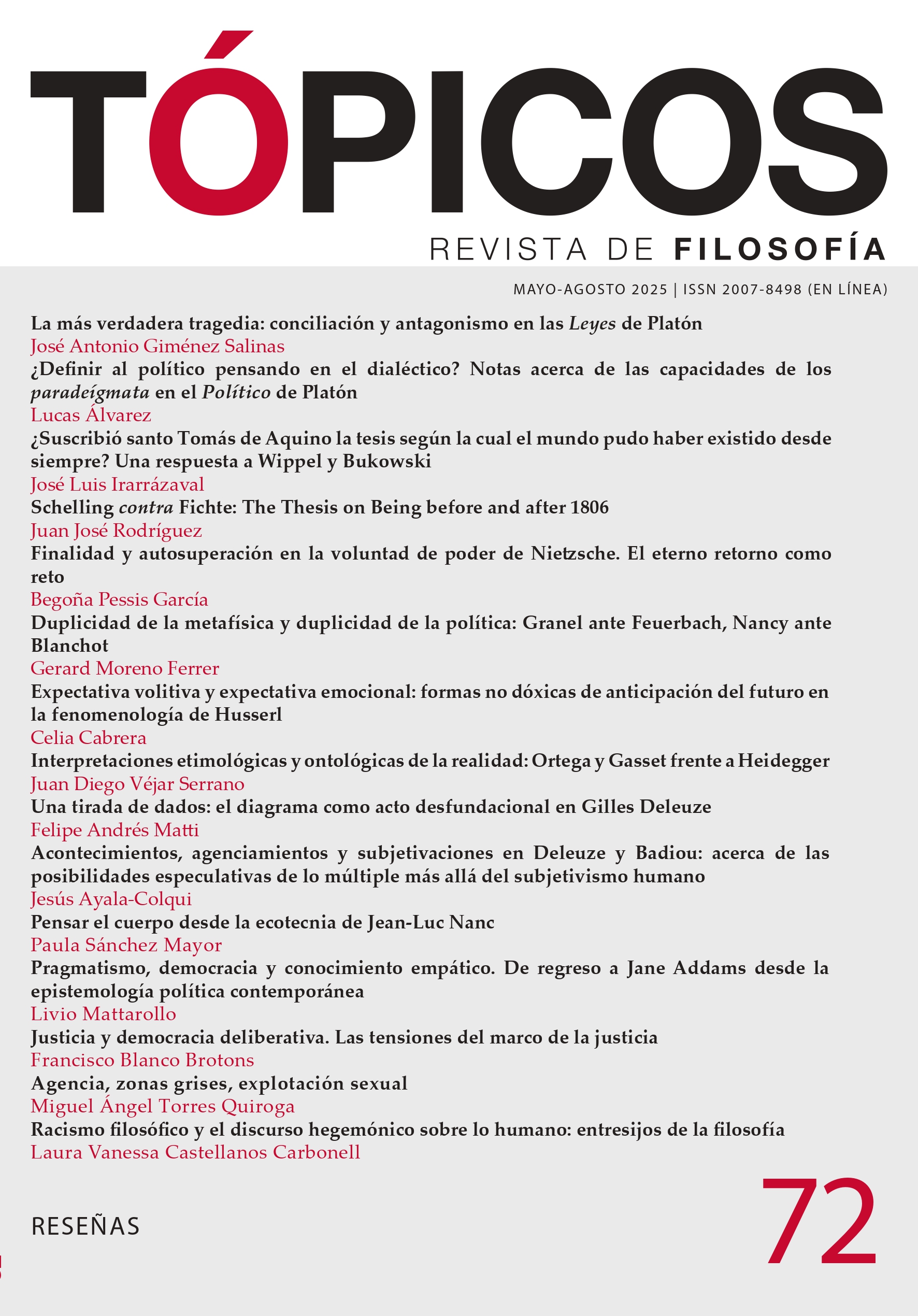Willing expectation and Emotional Expectation: Non-doxic Forms of Anticipating the Future in Husserl´s Phenomenology
Published 2025-03-18
Keywords
- phenomenology,
- time consciousness,
- emotions,
- will,
- phantasy
Copyright (c) 2025 Tópicos, Revista de Filosofía

This work is licensed under a Creative Commons Attribution-NonCommercial-NoDerivatives 4.0 International License.
How to Cite
Abstract
In manuscripts devoted to emotions and will published in the second and third volumes of the Studies on the Structure of Consciousness (XLIII/2-3), Husserl raises a pivotal question concerning the existence of a distinct and inherent form of expectation within emotion and willing (Hua XLIII/3, 285). Specifically, he introduces the terms “willing expectations” (Willenserwartungen) and “emotional expectations” (Gemütserwartungen), to describe a form of future-directedness that diverges from empirical and intellectual expectations, and which belong to the emotional sphere (Gemüt), broadly constructed. By delving into a selection of these manuscripts, this paper clarifies the meaning of these forms of anticipation of the future which involve an affective tension and a conception of the future as a practical horizon of realization of a goal. It also clarifies how these are different from what Husserl calls “intellectual (or theoretical) expectations” and empirically motivated expectations.
References
- Depraz, N. (1998). Can I Anticipate Myself? Self-Affection and Temporality. En D. Zahavi (ed.), Self-Awareness, Temporality, and Alterity: Central Topics in Phenomenology. (pp. 83-97). Kluwer. https://doi.org/10.1007/978-94-015-9078-5_5
- DeRoo, N. (2008). The Future Matters: Protention as More than Inverse Retention. Bulletin d’Analyse Phénoménologique, 4(7), 1-18.
- Drummond, J. (2021). Voluntary Action, Chosen Action, and Resolve. The Journal of the British Society for Phenomenology, 52(2), 133-144. https://doi.org/10.1080/00071773.2021.1977092
- Husserl, E. (1966). [Hua XI]. Analysen zur passiven Synthesis. Aus Vorlesungs- und Forschungsmanuskripten (1918-1926). M. Fleischer (ed.). Martinus Nijhoff.
- Husserl, E. (1969). [Hua X]. Zur Phänomenologie des inneren Zeitbewusstseins (1893-1917). R. Boehm (ed.). Martinus Nijhoff. https://doi.org/10.1007/978-94-015-3945-6
- Husserl, E. (1976). [Hua III]. Ideen zu einer reinen Phänomenologie und phänomenologischen Philosophie. Erster Buch. K. Schuhmann (ed). Martinus Nijhoff. https://doi.org/10.1007/978-94-010-1041-2_7
- Husserl, E. (1984). [Hua XIX/1-2] Logische Untersuchungen. Zweiter Teil. Untersuchungen zur Phänomenologie und Theorie der Erkenntnis. In zwei Bänden. U. Panzer (ed.). Martinus Nijhoff.
- Husserl, E. (1985). Erfahrung und Urteil. Untersuchungen zur Genealogie der Logik. Felix Meiner.
- Husserl, E. (1988). [Hua XXVIII]. Vorlesungen über Ethik und Wertlehre (1908-1914). U. Melle (ed.). Kluwer Academic Publishers.
- Husserl, E. (2001). [Hua XXXIII]. Die Bernauer Manuskripte über das Zeitbewusstsein (1917-1918). R. Bernet y D. Lohmar (eds.). Kluwer.
- Husserl, E. (2002). Lecciones de fenomenología de la conciencia interna del tiempo. A. Serrano de Haro (trad.). Trotta.
- Husserl, E. (2004a). [Hua XXXVIII]. Wahrnehmung und Aufmerksamkeit. Texte aus dem Nachlass (1893-1912). T. Vongehr y R. Giuliani (eds.). Springer.
- Husserl, E. (2004b). [Hua XXXVII]. Einleitung in die Ethik. Vorlesungen Sommersemmester (1920-1924). H. Peucker (ed.). Kluwer.
- Husserl, E. (2005). Ideas relativas a una fenomenología pura y una filosofía fenomenológica. Libro segundo. Investigaciones fenomenológicas sobre la constitución. A. Zirión (trad.). Fondo de Cultura Económica.
- Husserl, E. (2006). [Hua Mat VIII]. Späte Texte über Zeitkonstitution (1929-1934). D. Lohmar (ed.). Springer.
- Husserl, E. (2009). Investigaciones lógicas. M. G. Morente y J. Gaos (trads.). Alianza.
- Husserl, E. (2020a). [Hua XLII/2]. Studien zur Struktur des Bewusstseins. Teilband II: Gefühl und Wert. Texte aus dem Nachlass (1896 – 1925). U. Melle y T. Vongehr (eds.). Springer. https://doi.org/10.1007/978-3-030-35926-3
- Husserl, E. (2020b). [Hua XLII/3]. Studien zur Struktur des Bewusstseins. Teilband III: Wille und Handlung. Texte aus dem Nachlass (1902-1934). U. Melle y T. Vongehr (eds.). Springer. https://doi.org/10.1007/978-3-030-35928-7
- Katz, A. (2024). Funciones de la fantasía en la fenomenología de Husserl: una aproximación a su carácter quasi-productivo, Ideas y Valores, 73(184), 81-103. https://doi.org/10.15446/ideasyvalores.v73n184.101953
- Lohmar, D. (2002). What Does Protentions Protend? Remarks on Husserl´s Analyses on Protention in the Bernau Manuscripts on Time Consciousness. Philosophy Today, 46(5), 154-167. https://doi.org/10.5840/philtoday200246Supplement18
- Mensch, J. (1999). Husserl´s Concept of The Future. Husserl Studies, 16(1), 41-64. https://doi.org/10.1023/A:1006220622039
- Mertens, K. (1998). Husserl’s Phenomenology of Will in his Reflections on Ethics. En N. Depraz y D. Zahavi (eds.), Alterity and Facticity (pp. 121-138). Kluwer. https://doi.org/10.1007/978-94-011-5064-4_6
- Mertens, K. (2021). Phenomenology of Willing in Pfänder and Husserl. En C. Erhard y T. Keiling (eds.), The Routledge Handbook of Phenomenology of Agency (pp. 15-28). Routledge. https://doi.org/10.4324/9781315104249-4
- Micali, S. (2022). Phenomenology of Anxiety. Springer. https://doi.org/10.1007/978-3-030-89018-6
- Rodemeyer, L. (2003). Developments in the Theory of Time-Consciousness. An Analysis of Protention. In D. Welton (ed.), The New Husserl (pp. 125-156). Bloomington.
- Scanziani, A. (2021). Interés y sentimiento. Los análisis husserlianos sobre el interés y su relación con el placer, el instinto y la atención. En C. Cabrera y M. Szeftel (eds.), Fenomenología de la vida afectiva (pp. 141-166). SB.
- Soueltzis, N. (2021). Protention in Husserl´s Phenomenology. Springer. https://doi.org/10.1007/978-3-030-69521-7
- Staiti, A. (2019). Husserl’s Account of Action: Naturalistic or Anti-naturalistic? A Journey Through the Studien zur Struktur des Bewusstseins. En R. Parker, B. Hopkins, I. Quepons y J. Drummond (eds.), The New Yearbook for Phenomenology and Phenomenological Philosophy (pp. 8-21). Routledge.
- Vicuña Zauschkevich, E. (2010). Para una fenomenología de la acción. Aproximación a una teoría husserliana de la acción a partir de la idea de cumplimiento (Erfüllung) práctico. Cuadernos de Anuario Filosófico. https://hdl.handle.net/10171/36908
- Vongher, T. (2013). Husserls Versuch einer Typologie der Handlungen. En I. Gunzler y K. Mertens (eds.), Wahrmehmen, Fühlen, Handeln. Phänomenologie im Wettstreit der Methoden (pp. 315-334). Mentis. https://doi.org/10.30965/9783897859722_026
- Zirión, A. (2018). Colorations and Moods in Husserl´s Studien zur Struktur des Bewusstseins (with a Final Hint toward the Colouring of Life). En R. Parker, B. Hopkins, I. Quepons y J. Drummond (eds.), The New Yearbook for Phenomenology and Phenomenological Philosophy (pp. 41-75). Routledge. https://doi.org/10.4324/9780429470141-3





